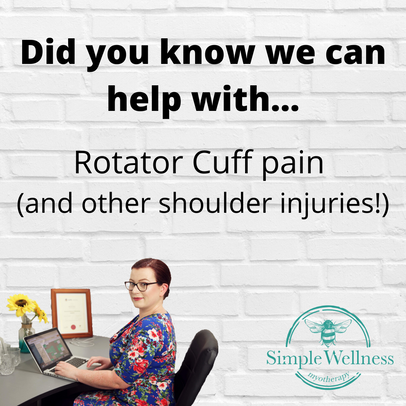Most people have heard of the Rotator Cuff being a big culprit of shoulder pain, but do you know what it is and how to get help?
Our Myotherapists and Remedial Massage Therapists help a lot of people with Rotator Cuff pain - its one of our most commonly treated pains!
Our Myotherapists and Remedial Massage Therapists help a lot of people with Rotator Cuff pain - its one of our most commonly treated pains!
The Rotator Cuff is a group of 4 muscles that all work together, and they have different actions. So when you come in with a Rotator Cuff injury, the first thing we’ll work out for you is which muscle is causing you to feel the pain.
The job of the Rotator Cuff group is to move and stabilise your shoulder, and it does that by making what I like to light heartedly call the Shoulderblade Sandwich. Imagine your shoulderblade bone (scapula) as the filling of the sandwich, and the Rotator Cuff muscles are the bread on either side. The muscles on the outer side work to lift your arm and rotate it outwards away from your body, and the inner muscles rotate your arm inwards.
The most common issues we see with Rotator Cuff complaints is tight muscles referring pain, or muscle tears.
Rotator Cuff referral pains can be felt locally around the shoulder, as well as further down your arm, elbow, wrist and hand.
If you've got a Rotator Cuff tear or a partial Rotator Cuff tear, you'll likely notice pain and difficulty on raising or rotating your arm.
Muscle tears can be identified on an ultrasound. If you’ve already had the ultrasound and been given the report that you have a tear, the next step for you is to rehabilitate that muscle, and we can help!
Pain from shoulder and Rotator Cuff injuries usually respond well to hands on treatments like massage, cupping, or dry needling. We also like to help stabilise your shoulder using kinesiotaping.
So how do you get help if you think you might have a Rotator Cuff problem?
Firstly, book a time to come see us so we can help you find which of those 4 muscles is acting up. We’ll do some muscle testing and make a plan for reducing your pain and getting you strong again.
If we think you may need an ultrasound to check for possible muscle tears, we can refer you to Dr Waj Dib here at Together Medical Family Practice in Knoxfield. Dr Dib is a fully bulk billed GP who can send you for scans if you need them.
The job of the Rotator Cuff group is to move and stabilise your shoulder, and it does that by making what I like to light heartedly call the Shoulderblade Sandwich. Imagine your shoulderblade bone (scapula) as the filling of the sandwich, and the Rotator Cuff muscles are the bread on either side. The muscles on the outer side work to lift your arm and rotate it outwards away from your body, and the inner muscles rotate your arm inwards.
The most common issues we see with Rotator Cuff complaints is tight muscles referring pain, or muscle tears.
Rotator Cuff referral pains can be felt locally around the shoulder, as well as further down your arm, elbow, wrist and hand.
If you've got a Rotator Cuff tear or a partial Rotator Cuff tear, you'll likely notice pain and difficulty on raising or rotating your arm.
Muscle tears can be identified on an ultrasound. If you’ve already had the ultrasound and been given the report that you have a tear, the next step for you is to rehabilitate that muscle, and we can help!
Pain from shoulder and Rotator Cuff injuries usually respond well to hands on treatments like massage, cupping, or dry needling. We also like to help stabilise your shoulder using kinesiotaping.
So how do you get help if you think you might have a Rotator Cuff problem?
Firstly, book a time to come see us so we can help you find which of those 4 muscles is acting up. We’ll do some muscle testing and make a plan for reducing your pain and getting you strong again.
If we think you may need an ultrasound to check for possible muscle tears, we can refer you to Dr Waj Dib here at Together Medical Family Practice in Knoxfield. Dr Dib is a fully bulk billed GP who can send you for scans if you need them.
